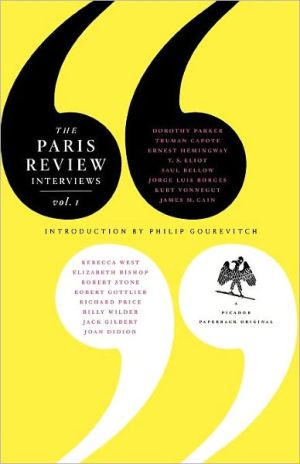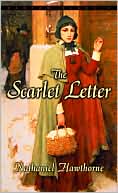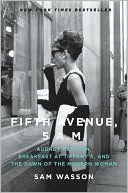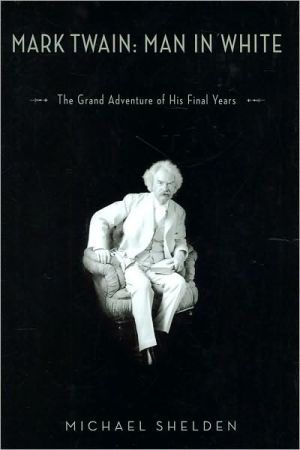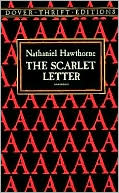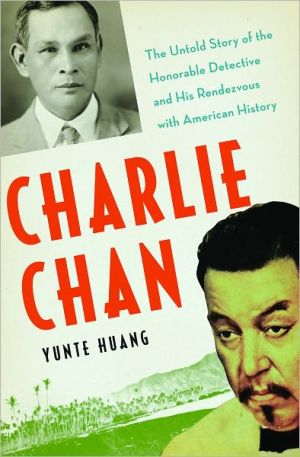The Paris Review Interviews: Volume 1
A Picador Paperback Original\ How do great writers do it? From James M. Cain's hard-nosed observation that "writing a novel is like working on foreign policy. There are problems to be solved. It's not all inspirational," to Joan Didion's account of how she composes a book—"I constantly retype my own sentences. Every day I go back to page one and just retype what I have. It gets me into a rhythm"—The Paris Review has elicited some of the most revelatory and revealing thoughts from the...
Search in google:
A Picador Paperback OriginalHow do great writers do it? From James M. Cain's hard-nosed observation that "writing a novel is like working on foreign policy. There are problems to be solved. It's not all inspirational," to Joan Didion's account of how she composes a book—"I constantly retype my own sentences. Every day I go back to page one and just retype what I have. It gets me into a rhythm"—The Paris Review has elicited some of the most revelatory and revealing thoughts from the literary masters of our age. For more than half a century, the magazine has spoken with most of our leading novelists, poets, and playwrights, and the interviews themselves have come to be recognized as classic works of literature, an essential and definitive record of the writing life. They have won the coveted George Polk Award and have been a contender for the Pulitzer Prize. Now, Paris Review editor Philip Gourevitch introduces an entirely original selection of sixteen of the most celebrated interviews. Often startling, always engaging, these encounters contain an immense scope of intelligence, personality, experience, and wit from the likes of Elizabeth Bishop, Ernest Hemingway, Truman Capote, Rebecca West, and Billy Wilder. This is an indispensable book for all writers and readers.Library JournalHow does an author write a book? In this remarkably affordable collection by the editors of the Paris Review, the first of a three-volume series, 16 previously published interviews with major novelists, poets, and playwrights divulge how works of literature are created. A 1966 interview with Jorge Luis Borges addresses his superstitions related to colors and how he bases his characters' names on colors and deceased relatives. In an interview published in 1977, Kurt Vonnegut Jr. discusses how his military experience and master's degree in anthropology influence his writing. Vonnegut's most stunning comment is "There is no shortage of wonderful writers. What we lack is a dependable mass of readers." Other authors featured her include Ernest Hemingway, Rebecca West, Truman Capote, and Robert Stone. A bonus is that most writers identify their favorite books. This publication is highly recommended for public and academic libraries.-Joyce Sparrow, Juvenile Welfare Board of Pinellas Cty., FL Copyright 2006 Reed Business Information.
Introduction by Philip GourevitchDorothy Parker (1956)Truman Capote (1957)Ernest Hemingway (1958)T. S. Eliot (1959)Saul Bellow (1966)Jorge Luis Borges (1967)Kurt Vonnegut (1977)James M. Cain (1978)Rebecca West (1981)Elizabeth Bishop (1981)Robert Stone (1985)Robert Gottlieb (1994)Richard Price (1996)Billy Wilder (1996)Jack Gilbert (2005)Joan Didion (2006)ContributorsAcknowledgments
\ From the Publisher"The Paris Review books should be given out at dinner parties, readings, riots, weddings, galas — shindigs of every shape. And they're perfect for the classroom too, from high schools all the way to MFA programs. In fact, I run a whole semester-long creative writing class based on the interviews. How else would I get the world's greatest living writers, living and dead, to come into the classroom with their words of wisdom, folly and fury? These books are wonderful, provocative, indispensible."—Colum McCann, novelist and Hunter College professor\ "I have all the copies of The Paris Review and like the interviews very much. They will make a good book when collected and that will be very good for the Review."—Ernest Hemingway\ "At their best, the Paris Review interviews remove the veils of literary personae to reveal the flesh-and-blood writer at the source. By exposing the inner workings of writing, they place the reader in the driver's seat of literature."—Billy Collins\ "A colossal literary event—worth the price of admission for the Borges interview alone, and of course the Billy Wilder, and the Vonnegut, and and and and . . . Just buy this book and read it all."—Gary Shteyngart\ "The Paris Review interviews have the best questions, the best answers, and are, hands down, the best way to steal a look into the minds of the best writers (and interviewers) in the world. Reading them together is like getting a fabulous guided tour through literary life."—Susan Orlean\ "The Paris Review interviews are of course a genre unto themselves. We read them hoping the subjects will somehow betray themselves and pass their secrets for writing on to us. Although this never happens, the interviews bring us a little closer to understanding genius. This stellar collection of them is as good a place as any to start."—John Ashbery\ "I have been fascinated by the Paris Review interviews for as long as I can remember. Taken together, they form perhaps the finest available inquiry into the 'how' of literature, in many ways a more interesting question than the 'why.'"—Salman Rushdie\ "The Paris Review's Writers at Work series is thrilling and terrifying, in part because the writers in the interviews are not technically at work. But nonetheless! here are their wise secrets, their funny stories, their habits, dubious opinions, financial complaints—these glimpses comprise an engaging and important literary record."—Lorrie Moore\ "Nothing is lonelier or riskier than being a writer, and these interviews provide writers at all stages the companionship and guidance they need."—Edmund White\ "The Paris Review interviews have always provided the best look into the minds and work ethics of great writers and when read together constitute the closest thing to an MFA that you can get while sitting alone on your couch. Every page of this collection affords a ludicrous amount of pleasure."—Dave Eggers\ "The Paris Review interviews are objects of wonder that formed my first and fiercest impression of what it was to be an author. I still ascribe any vivid remembered quote to their pages, even when it didn't appear there."—Jonathan Lethem\ "The Paris Review is one of the few truly essential literary magazines of the twentieth century—and now of the twenty-first."—Margaret Atwood\ \ \ \ \ \ Library JournalHow does an author write a book? In this remarkably affordable collection by the editors of the Paris Review, the first of a three-volume series, 16 previously published interviews with major novelists, poets, and playwrights divulge how works of literature are created. A 1966 interview with Jorge Luis Borges addresses his superstitions related to colors and how he bases his characters' names on colors and deceased relatives. In an interview published in 1977, Kurt Vonnegut Jr. discusses how his military experience and master's degree in anthropology influence his writing. Vonnegut's most stunning comment is "There is no shortage of wonderful writers. What we lack is a dependable mass of readers." Other authors featured her include Ernest Hemingway, Rebecca West, Truman Capote, and Robert Stone. A bonus is that most writers identify their favorite books. This publication is highly recommended for public and academic libraries.-Joyce Sparrow, Juvenile Welfare Board of Pinellas Cty., FL Copyright 2006 Reed Business Information.\ \
